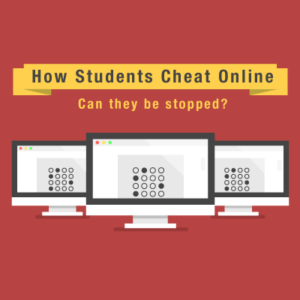How Students Cheat Online
“Can they be stopped?”
To Cheat or not to cheat- an age old question that has taken on new meaning with the inception of online college courses. The question we are facing today- are online courses really giving students the go ahead to cheat?
What is academic cheating?
- Plagiarism or passing off someone else’s work as your own
- Purchasing a term paper or test
- Paying someone to do work/take a test for you
- Cheat sheets, using notes/books when instructed not to, etc.
- 73% of ALL test takers believe that every student cheats at one point in their academic career
- Students who admit to “paraphrasing/copying few sentences from Internet source without footnoting it.”
- 36% of undergraduate students
- 24% of graduate students
- Students who admit to “paraphrasing/copying few sentences from written source without footnotes”
- 38% of undergraduate students
- 25% of graduate students
- Students who admit to copying “almost word for word from a written source without citation.”
- 7% of undergraduate students
- 4% of graduate students
- Increased competition for undergraduate/graduate university programs have students doing “whatever it takes” to get an “A”
- Fall 2010: 6.1 million students took at least one online class
- Up 10.1% from the previous year
Academic dishonesty is a problem online and on campus
In a study of 635 undergraduate and graduate students:
- 32.7% admitted to cheating in online classes
- 32.1% admitted to cheating in live classrooms
- 2.1% of online students were caught cheating
- 4.9% of students in a live class were caught cheating
The Fight Against Online Cheating
[What isn’t working for everyone:] Regional Testing Centers for Online Students
- Adult students with jobs can’t take time off work
- Students in remote areas can’t afford to travel for testing services
[What is working:] Technological Advances in Online Test Taking
- Webcam proctors
- Students show identification and are watched by proctors from a remote location
- Proctors can see if the students are looking off camera at notes or books
- Plagiarism detection software
- Tool that scans web content, looking for existing materials
- Keystroke Recognition Devices
- Program registers speed and rhythm of student’s keystrokes
- Monitor later assignments to match patterns
- Biometric technology
- Fingerprint identification
- Iris recognition
- Independent Coursework
- Many online courses are completely eliminating the temptation to cheat
- Remove multiple choice tests/quizzes
- Require independent thought and preparation for assignments
- Implement the use of forums and discussion boards to foster interaction
Recommended Schools
The College Opportunity and Affordability Act
- 2008: Congress proposed an act to ensure academic honesty
- Institutions with distance education programs must establish that the student participating in the online activities is the same student who is receiving academic credit
- Is it possible that today’s technology could be more efficient at catching cheaters than a live professor?
- Douglas H. Fisher, Vanderbilt University, Computer Science and Computer Engineering Professor
- “Having a camera watch you, and software keep track of your mouse clicks does smack of Big Brother. But it doesn’t seem any worse than an instructor at the front constantly looking at you, and it may even be more efficient.”
Most teachers and professors have the uncanny knack of knowing when a student is cheating.
It is called common sense.
The end result:
-
- Students who want to cheat, will continue to cheat online or in a traditional classroom
- Students who want to learn and better themselves know that cheating won’t help with long term goals
Desire, Drive, and Determination in collegiate endeavors lead to integrity in a student’s future career!
Sources:
- http://www.huffingtonpost.com/2012/07/26/online-courses-do-student_n_1704172.html
- http://www.usnews.com/education/online-education/articles/2014/06/17/think-twice-before-cheating-in-online-courses
- http://www.glass-castle.com/clients/www-nocheating-org/adcouncil/research/cheatingfactsheet.html
- http://distancelearn.about.com/od/distancelearning101/a/Cheating-In-Online-College-Classes-A-Virtual-Epidemic.htm
- http://www.usnews.com/education/online-education/articles/2012/11/26/online-education-programs-tackle-student-cheating

